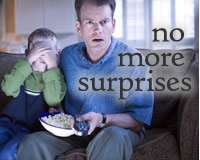Children Concerned About Sex, Violence in Media
 Media Release 30 Mar 2015
Media Release 30 Mar 2015
Family First NZ says that the Children’s Media Use Study by NZ on Air and the BSA is sounding alarm bells about the levels of violence and sexual content being viewed by children 9-14 years old, and the concerns of the children themselves and also their parents.
The study shows that parents’ main concerns with television include children being exposed to violence (71%), sexual content (61%), adult programmes (40%), and bad language (39%). Online, it is children being exposed to sexual material (72%), violence (46%), unintentional access to inappropriate sites (44%), or adult sites (36%).
Three in five children said they have been exposed to some content on TV or online that they didn’t like, or that bothered or upset them. Exposure to aspects of violence, sex, pornography and inappropriate advertising has increased since 2007. Foul language is the most common type of challenging content heard on radio.
“The good news is that parents are being far more active in monitoring their children’s use – but why are children being exposed to this material in the first place. Our first concern should be the protection and welfare of children,” says Bob McCoskrie, National Director of Family First NZ.
“The Broadcasting Standards Authority which ironically commissioned the research have tried to argue that their standards are reflecting community standards and that there is a ‘softening’ of attitudes. However, it is quite clear that as they allow broadcasters to push the boundaries, the standards are lowered, offensive material becomes more mainstream, and is then used far more in the media. Families are now telling us that they think it is pointless complaining, yet they are more and more concerned about declining standards.”
“Also of concern is that only one in three parents have software on devices to prevent access to certain objectionable or inappropriate online sites,” says Mr McCoskrie.
In 2013 the BSA released a survey which shows that their own standards are out of sync with the views of the public. The survey, What not to Swear: The acceptability of words in Broadcasting, reveals that highly offensive words – deemed unacceptable by half of the respondents in their survey – can still be heard anytime from 8.30pm onwards on television in NZ, and often during so-called family movies.
“Parents are sick and tired of lunging for the remote to protect children from offensive and inappropriate content – including promos for upcoming adult-rated programmes during the early evening, and even during news programmes which children may be watching for educational purposes,” says Mr McCoskrie.
Family First continues to call for the development and enforcing of higher standards for TV, film, radio and advertising content including stronger censorship of violence, sexual content and objectionable language, and a complete overhaul of the BSA, ASA and Censorship Board with greater community and family representation. Family First has already called on the government to join the UK in having pornography blocked by their internet provider unless they specifically choose to receive it.
ENDS






